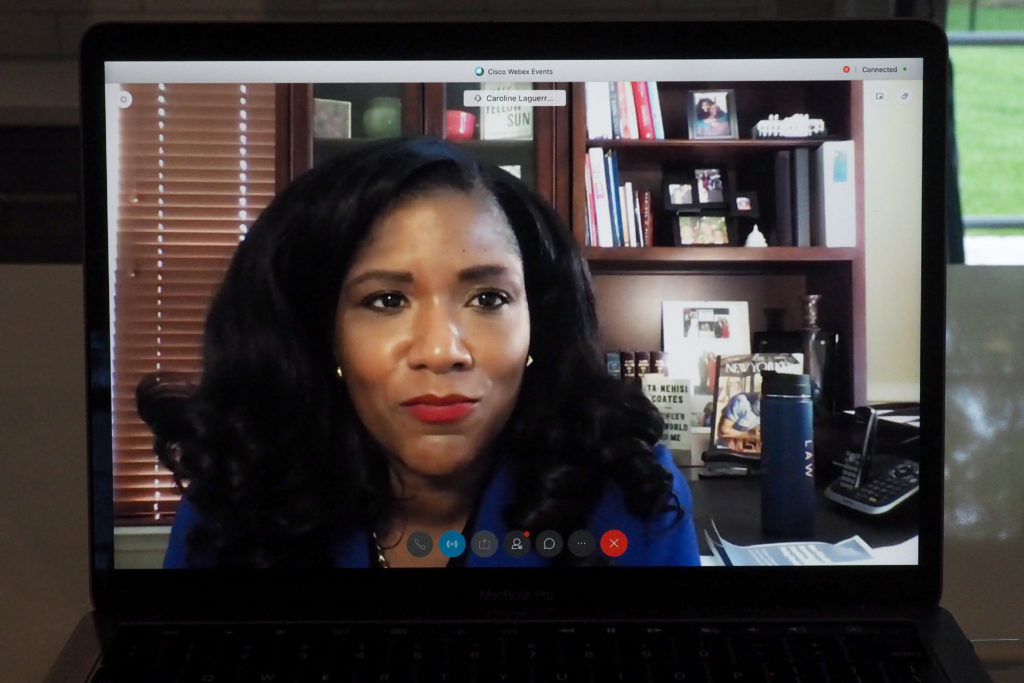Officials announced changes to GW’s Title IX policies to abide by new U.S. Department of Education regulations at a Faculty Senate meeting Friday.
The new regulations – which must be implemented by Aug. 14 – include measures like narrowing the definition of sexual harassment and eliminating the single-investigator model in favor of multiple-person hearing boards. Caroline Laguerre-Brown, the vice provost for diversity, equity and community engagement, said the University must adopt stipulations like the new definition of sexual harassment but has the flexibility to choose how to determine responsibility for misconduct and can require faculty and staff to be designated reporters.
Laguerre-Brown said officials are required by federal law to adopt the ED’s definition of sexual harassment as “unwelcome” sexual conduct that is so “severe, pervasive and objectively offensive” that it effectively denies equal access to educational opportunities. But she said officials will refer cases involving students, faculty and staff that do not meet the ED’s new standard to the Office of Student Rights and Responsibilities, the Office for Faculty Affairs and the Equal Employment Opportunity and Employee Relations office.
“We did not want a circumstance where cases that did not meet the more stringent definition be unaddressed by the University, and it may be there’s an array of things we might consider on the cases that don’t meet the standard, but we want to make sure there is a place at the University for review and assessment of those types of issues,” she said.
Laguerre-Brown said that under the new regulations, Title IX only applies to programs and activities over which the University exercises “substantial control” over the respondent, or accused, and the context in which the sexual misconduct occurred. She said officials are no longer obligated to respond to incidents of sexual misconduct that occur within study abroad programs outside the United States, marking a “significant” departure from current GW policy.
Laguerre-Brown said GW will continue to exercise Title IX jurisdiction to address misconduct that occurs in University-owned buildings and facilities owned or controlled by student organizations, like fraternities that are recognized by the University.
She said GW’s Title IX policy will continue to cover cases of misconduct that occur off campus or outside of GW programs and activities, including in study abroad programs, based on factors like “proximity to the community, nexus to our programs or activities or when the alleged conduct creates or continues a hostile environment on our campus.”
“We want to have some flexibility to be able to address those concerns if we think they have the potential to have an impact on our campus community,” Laguerre-Brown said.
The ED no longer requires faculty, staff and advisers to be “responsible employees,” but Laguerre-Brown said officials will continue to require designated faculty and staff to file a report if made aware of an instance of sexual misconduct. She said maintaining the mandatory reporting policy will ensure that faculty and staff have the capacity to direct sexual assault survivors to counseling, academic accommodations and other forms of support.
“We should continue to require the same list of designated individuals to report allegations or incidents of sexual harassment to the Title IX coordinator understanding that under the new rules, notice to those individuals does not constitute actual knowledge under the institution,” she said.
Laguerre-Brown said GW will retain its use of the “preponderance of evidence,” or “more likely than not,” standard for determining responsibility instead of the “clear and convincing” standard, which requires more evidence to prove guilt. The new regulations permit universities to choose one of the two standards of evidence provided that officials use the same standard for all formal complaints against students, faculty and staff.
“We don’t have any plans right now to make any change in that area,” she said.
Laguerre-Brown said GW must forgo the single-investigator model in favor of multiple-person hearing boards, and officials are currently planning to enlist experienced former judges and attorneys who will receive “specialized training” to determine case outcomes. She said federal law also mandates respondents and complainants have an adviser to cross-examine the other party during live hearings with “real-time” evidentiary decisions.
Respondents and complainants can consult with an adviser of their choosing throughout the grievance process, and the University must provide an adviser for cross-examination if a party does not have one, as parties cannot directly cross-examine one another.
Title IX experts and survivor advocates have expressed concerns that requiring cross-examination during live hearings will have a “chilling” effect on reporting of sexual misconduct, as survivors of sexual violence may be reluctant to relive past trauma in a public forum. Laguerre-Brown said she and other officials are discussing the possibility of enforcing rules of decorum and allowing case hearings to occur virtually to make the process less overwhelming for survivors.
She said respondents and complainants can appeal a case decision if there is a material deviation from the procedures, “new and relevant” evidence, bias or a conflict of interest that affected the outcome of the case. Laguerre-Brown added that officials will continue to allow respondents and complainants to also appeal if a sanction is “inappropriate or disproportionate” to the conduct for which the respondent was found responsible.
“The appeal review will be conducted by an appeal officer who will be impartial and free from actual bias or conflict of interest,” she said. “The proposed appeals process is substantively the same as our current process.”
Isha Trivedi contributed reporting.











